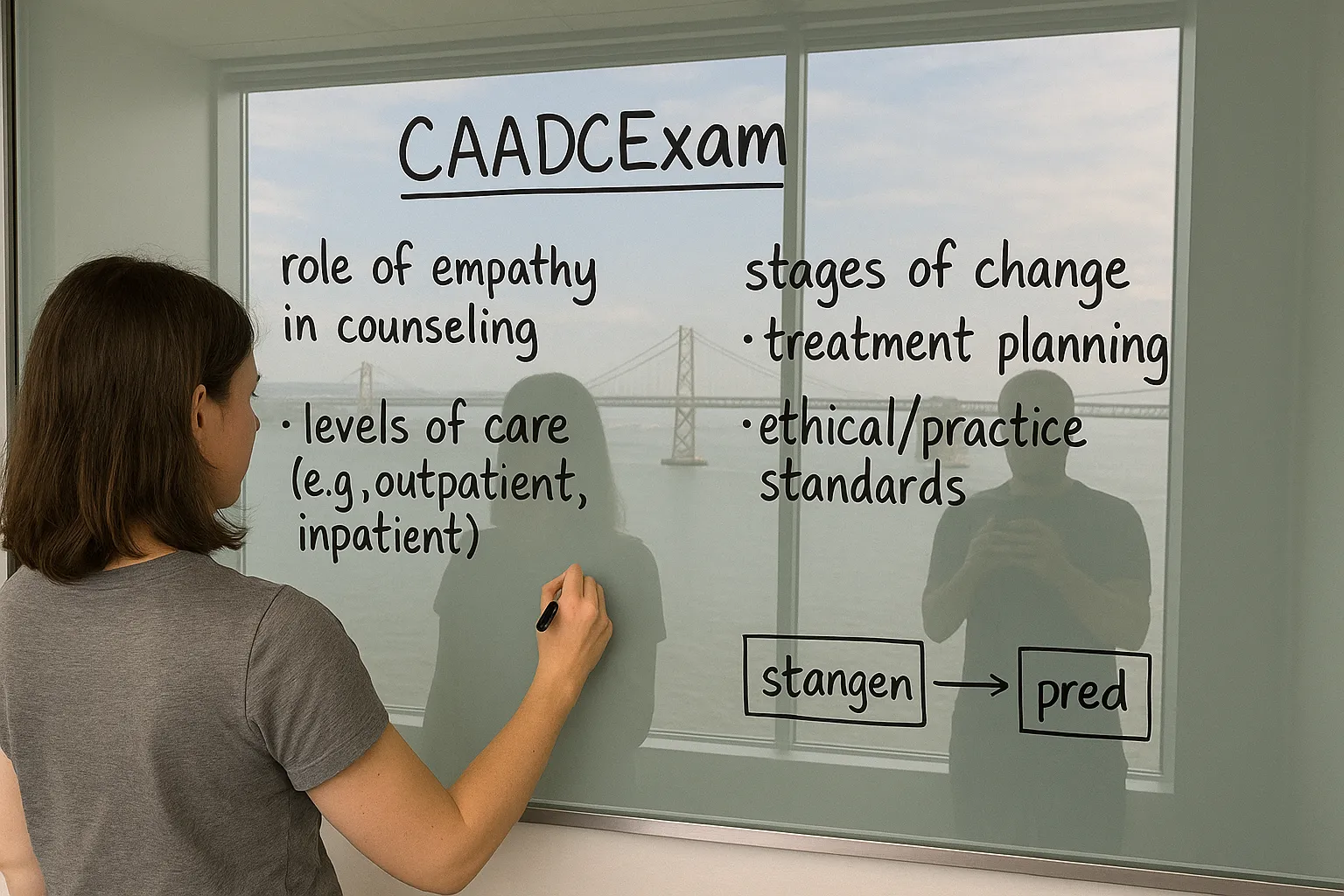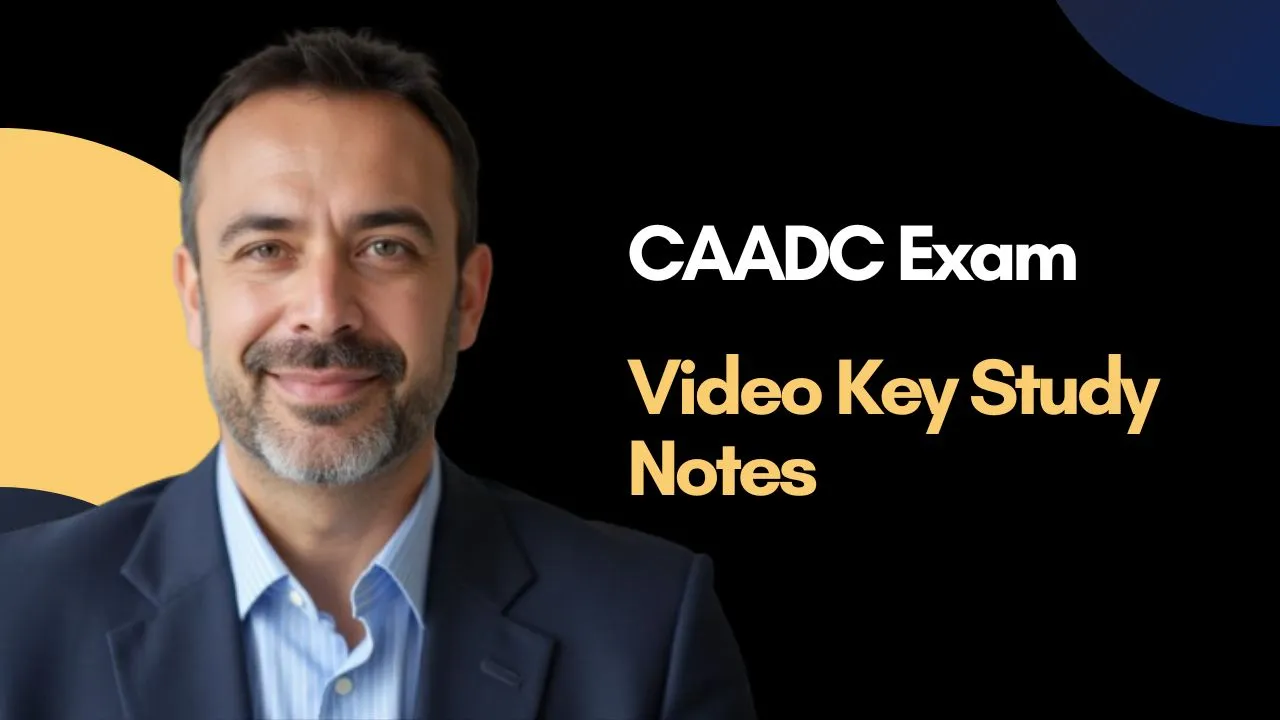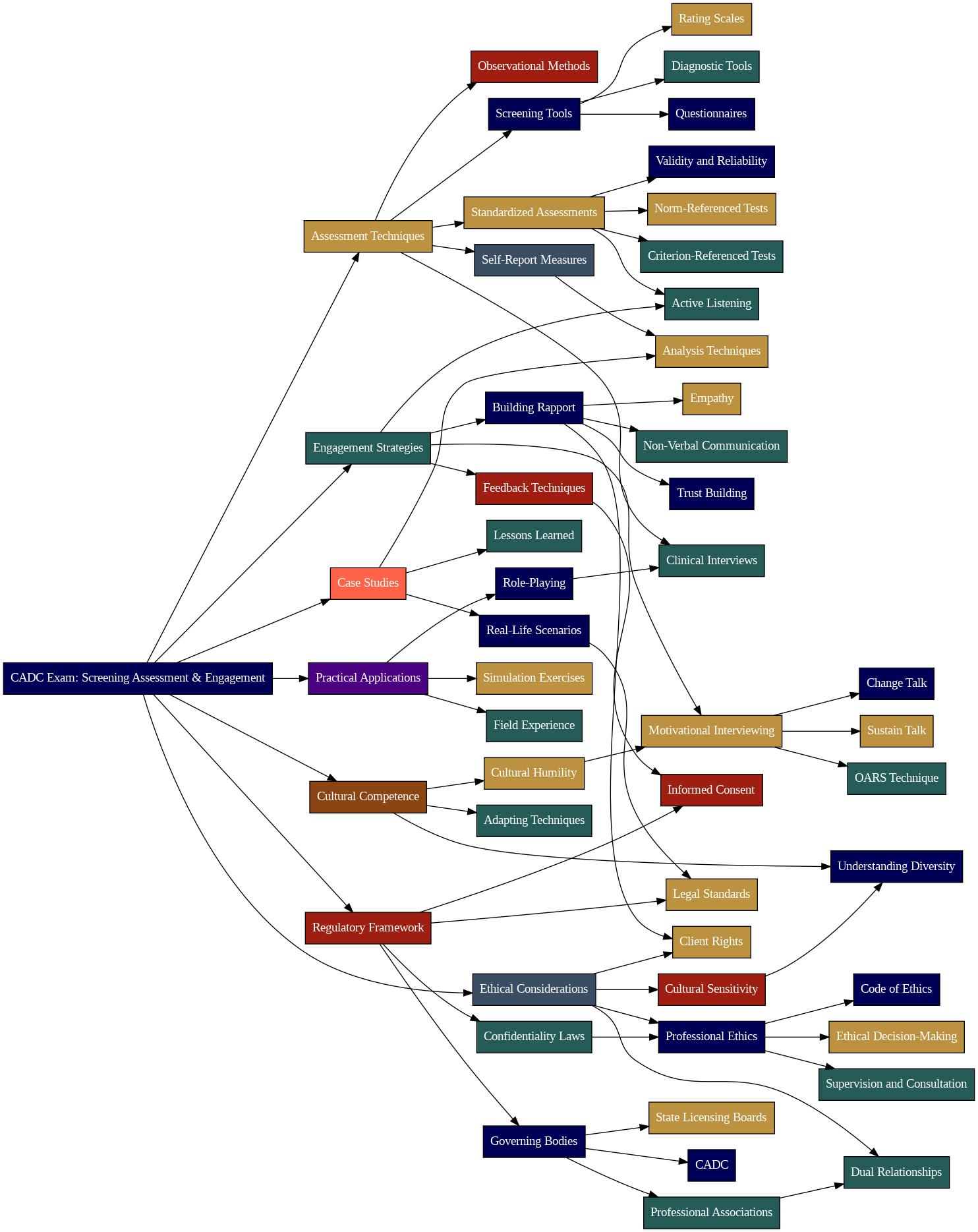Quiz-summary
0 of 30 questions completed
Questions:
- 1
- 2
- 3
- 4
- 5
- 6
- 7
- 8
- 9
- 10
- 11
- 12
- 13
- 14
- 15
- 16
- 17
- 18
- 19
- 20
- 21
- 22
- 23
- 24
- 25
- 26
- 27
- 28
- 29
- 30
Information
Premium Practice Questions
You have already completed the quiz before. Hence you can not start it again.
Quiz is loading...
You must sign in or sign up to start the quiz.
You have to finish following quiz, to start this quiz:
Results
0 of 30 questions answered correctly
Your time:
Time has elapsed
Categories
- Not categorized 0%
- 1
- 2
- 3
- 4
- 5
- 6
- 7
- 8
- 9
- 10
- 11
- 12
- 13
- 14
- 15
- 16
- 17
- 18
- 19
- 20
- 21
- 22
- 23
- 24
- 25
- 26
- 27
- 28
- 29
- 30
- Answered
- Review
-
Question 1 of 30
1. Question
A client, resident of Louisiana, in addiction counseling discloses to their LAC that they physically abused their child several years ago. The client expresses deep remorse and states that they have not engaged in any abusive behavior since. The child is currently safe and well cared for. According to Louisiana law and ethical guidelines for LACs, what is the MOST appropriate course of action for the counselor?
Correct
Louisiana LACs are bound by both the general ethical principles of counseling and specific regulations outlined in the Louisiana Administrative Code (LAC). A critical aspect of ethical practice is understanding the limits of confidentiality, particularly concerning mandated reporting. In Louisiana, mandated reporting laws require licensed professionals to report suspected child abuse or neglect, elder abuse, and situations where a client poses an imminent threat to themselves or others. This duty overrides the general principle of confidentiality to protect vulnerable individuals and the public. Scenario analysis requires evaluating whether the information shared by the client triggers a mandated reporting obligation. The client’s disclosure of past physical abuse towards their child, without any indication of current or ongoing abuse, presents a complex ethical dilemma. While the past abuse is concerning, the absence of current threat significantly alters the counselor’s reporting obligations. The key factor is whether there is reasonable suspicion of ongoing or future harm. If the counselor believes, based on the client’s statements and behavior, that the child is not currently at risk and there is no indication of future abuse, then mandated reporting may not be required. However, the counselor must thoroughly document the rationale for this decision, including the assessment of risk and the client’s current circumstances. It is also crucial to consider the counselor’s responsibility to address the client’s past behavior in therapy. While mandated reporting may not be triggered, the counselor has an ethical obligation to explore the client’s past actions, help them understand the impact of their behavior on their child, and develop strategies to prevent future harm. This may involve individual therapy, parenting skills training, or referral to other appropriate services. The counselor must also consider the potential impact of disclosing the past abuse on the therapeutic relationship. Openly discussing the limits of confidentiality and the potential for mandated reporting is essential for building trust and maintaining ethical practice.
Incorrect
Louisiana LACs are bound by both the general ethical principles of counseling and specific regulations outlined in the Louisiana Administrative Code (LAC). A critical aspect of ethical practice is understanding the limits of confidentiality, particularly concerning mandated reporting. In Louisiana, mandated reporting laws require licensed professionals to report suspected child abuse or neglect, elder abuse, and situations where a client poses an imminent threat to themselves or others. This duty overrides the general principle of confidentiality to protect vulnerable individuals and the public. Scenario analysis requires evaluating whether the information shared by the client triggers a mandated reporting obligation. The client’s disclosure of past physical abuse towards their child, without any indication of current or ongoing abuse, presents a complex ethical dilemma. While the past abuse is concerning, the absence of current threat significantly alters the counselor’s reporting obligations. The key factor is whether there is reasonable suspicion of ongoing or future harm. If the counselor believes, based on the client’s statements and behavior, that the child is not currently at risk and there is no indication of future abuse, then mandated reporting may not be required. However, the counselor must thoroughly document the rationale for this decision, including the assessment of risk and the client’s current circumstances. It is also crucial to consider the counselor’s responsibility to address the client’s past behavior in therapy. While mandated reporting may not be triggered, the counselor has an ethical obligation to explore the client’s past actions, help them understand the impact of their behavior on their child, and develop strategies to prevent future harm. This may involve individual therapy, parenting skills training, or referral to other appropriate services. The counselor must also consider the potential impact of disclosing the past abuse on the therapeutic relationship. Openly discussing the limits of confidentiality and the potential for mandated reporting is essential for building trust and maintaining ethical practice.
-
Question 2 of 30
2. Question
A Licensed Addiction Counselor (LAC) in Louisiana, working with a client named Marie who is in recovery from opioid addiction, receives a subpoena for Marie’s treatment records from Marie’s ex-husband’s attorney, who is seeking evidence to use against Marie in a custody dispute. Marie has not consented to the release of her records. According to Louisiana regulations and ethical guidelines for LACs, what is the MOST appropriate course of action for the LAC?
Correct
According to Louisiana Administrative Code Title 46, Part XCI, Chapter 7, §703.B, a Licensed Addiction Counselor (LAC) must maintain client confidentiality, adhering to both state and federal regulations, including 42 CFR Part 2. This regulation strictly governs the confidentiality of alcohol and drug abuse patient records. Exceptions to confidentiality are limited and include situations such as client consent, court order, or mandated reporting situations as defined by Louisiana law (e.g., suspected child or elder abuse). Dual relationships are explicitly discouraged due to the potential for conflicts of interest and exploitation of the client. LACs must obtain informed consent, ensuring clients understand their rights, the nature of the counseling process, and the limits of confidentiality. Ethical decision-making models, such as the one proposed by Corey, Corey, and Callanan, emphasize identifying the problem, reviewing relevant ethical guidelines, considering potential courses of action, consulting with supervisors or colleagues, and selecting the best course of action. The LAC is accountable for their professional conduct and must adhere to the ethical guidelines set forth by the Louisiana Association of Substance Abuse Counselors and Trainers (LASACT) and the NAADAC, the Association for Addiction Professionals. In situations where a client discloses intent to harm another person, the counselor has a duty to warn, as outlined in relevant Louisiana statutes regarding duty to protect. Furthermore, cultural competence is crucial, requiring the LAC to understand and respect diverse cultural backgrounds and adapt counseling approaches accordingly.
Incorrect
According to Louisiana Administrative Code Title 46, Part XCI, Chapter 7, §703.B, a Licensed Addiction Counselor (LAC) must maintain client confidentiality, adhering to both state and federal regulations, including 42 CFR Part 2. This regulation strictly governs the confidentiality of alcohol and drug abuse patient records. Exceptions to confidentiality are limited and include situations such as client consent, court order, or mandated reporting situations as defined by Louisiana law (e.g., suspected child or elder abuse). Dual relationships are explicitly discouraged due to the potential for conflicts of interest and exploitation of the client. LACs must obtain informed consent, ensuring clients understand their rights, the nature of the counseling process, and the limits of confidentiality. Ethical decision-making models, such as the one proposed by Corey, Corey, and Callanan, emphasize identifying the problem, reviewing relevant ethical guidelines, considering potential courses of action, consulting with supervisors or colleagues, and selecting the best course of action. The LAC is accountable for their professional conduct and must adhere to the ethical guidelines set forth by the Louisiana Association of Substance Abuse Counselors and Trainers (LASACT) and the NAADAC, the Association for Addiction Professionals. In situations where a client discloses intent to harm another person, the counselor has a duty to warn, as outlined in relevant Louisiana statutes regarding duty to protect. Furthermore, cultural competence is crucial, requiring the LAC to understand and respect diverse cultural backgrounds and adapt counseling approaches accordingly.
-
Question 3 of 30
3. Question
Jamal, a Licensed Addiction Counselor (LAC) in Louisiana, is working with a client, DeShawn, who is struggling with opioid addiction. During a session, DeShawn reveals a detailed plan to inflict serious harm on his former supervisor, whom he blames for his job loss and subsequent descent into addiction. DeShawn has a history of violent behavior and possesses the means to carry out his plan. According to Louisiana’s ethical and legal standards for LACs, what is Jamal’s most appropriate course of action?
Correct
In Louisiana, Licensed Addiction Counselors (LACs) operate under a specific ethical framework guided by both the general principles of ethical counseling and the specific regulations outlined by the Louisiana State Board of Examiners of Addictions Professionals. Confidentiality is paramount, but it is not absolute. LACs are mandated reporters, meaning they are legally obligated to report suspected child abuse or neglect, abuse of the elderly or disabled, and situations where a client poses an imminent threat to themselves or others. The Tarasoff duty to warn applies in Louisiana, requiring counselors to take reasonable steps to protect potential victims when a client credibly threatens serious harm. Dual relationships are strongly discouraged and often prohibited, particularly those that could exploit the client or impair the counselor’s objectivity. Informed consent must be obtained before beginning treatment, ensuring the client understands the nature of the services, potential risks and benefits, and their right to refuse or terminate treatment. Cultural competence is also a critical ethical consideration, requiring counselors to be aware of and sensitive to the diverse cultural backgrounds of their clients. Failure to adhere to these ethical and legal standards can result in disciplinary action by the Board, including suspension or revocation of licensure. In this scenario, while maintaining client confidentiality is crucial, the counselor’s primary duty is to protect the potential victim from harm, overriding the usual confidentiality requirements.
Incorrect
In Louisiana, Licensed Addiction Counselors (LACs) operate under a specific ethical framework guided by both the general principles of ethical counseling and the specific regulations outlined by the Louisiana State Board of Examiners of Addictions Professionals. Confidentiality is paramount, but it is not absolute. LACs are mandated reporters, meaning they are legally obligated to report suspected child abuse or neglect, abuse of the elderly or disabled, and situations where a client poses an imminent threat to themselves or others. The Tarasoff duty to warn applies in Louisiana, requiring counselors to take reasonable steps to protect potential victims when a client credibly threatens serious harm. Dual relationships are strongly discouraged and often prohibited, particularly those that could exploit the client or impair the counselor’s objectivity. Informed consent must be obtained before beginning treatment, ensuring the client understands the nature of the services, potential risks and benefits, and their right to refuse or terminate treatment. Cultural competence is also a critical ethical consideration, requiring counselors to be aware of and sensitive to the diverse cultural backgrounds of their clients. Failure to adhere to these ethical and legal standards can result in disciplinary action by the Board, including suspension or revocation of licensure. In this scenario, while maintaining client confidentiality is crucial, the counselor’s primary duty is to protect the potential victim from harm, overriding the usual confidentiality requirements.
-
Question 4 of 30
4. Question
A Louisiana LAC, Monique, has been working with a client, Mr. Dubois, who owns a successful local business. Mr. Dubois, aware that Monique is struggling with personal debt, offers her a substantial, low-interest loan. Monique is experiencing financial hardship and is tempted to accept the offer. According to Louisiana’s regulations and ethical standards for LACs, what is Monique’s MOST appropriate course of action?
Correct
Louisiana’s regulations concerning Licensed Addiction Counselors (LACs) emphasize the importance of maintaining professional boundaries to ensure client well-being and the integrity of the therapeutic relationship. Dual relationships, particularly those involving financial transactions, are strictly scrutinized due to the inherent power imbalance and potential for exploitation. In this scenario, accepting a substantial loan from a client creates a conflict of interest that compromises the counselor’s objectivity and may impair their ability to provide unbiased care. Even if the client initiates the offer, the LAC has a professional responsibility to decline to safeguard the therapeutic process. Louisiana’s ethical guidelines, informed by broader counseling ethics, prioritize client welfare and prohibit actions that could exploit or harm clients. Accepting a loan also blurs the lines between a professional and personal relationship, potentially leading to compromised judgment and a loss of trust. Furthermore, it could create a situation where the client feels pressured or obligated, undermining their autonomy and the therapeutic alliance. The counselor’s primary duty is to act in the client’s best interest, and accepting a loan directly contravenes this principle. Reputable LACs in Louisiana must be aware of the regulations and ethical guidelines to avoid any violations.
Incorrect
Louisiana’s regulations concerning Licensed Addiction Counselors (LACs) emphasize the importance of maintaining professional boundaries to ensure client well-being and the integrity of the therapeutic relationship. Dual relationships, particularly those involving financial transactions, are strictly scrutinized due to the inherent power imbalance and potential for exploitation. In this scenario, accepting a substantial loan from a client creates a conflict of interest that compromises the counselor’s objectivity and may impair their ability to provide unbiased care. Even if the client initiates the offer, the LAC has a professional responsibility to decline to safeguard the therapeutic process. Louisiana’s ethical guidelines, informed by broader counseling ethics, prioritize client welfare and prohibit actions that could exploit or harm clients. Accepting a loan also blurs the lines between a professional and personal relationship, potentially leading to compromised judgment and a loss of trust. Furthermore, it could create a situation where the client feels pressured or obligated, undermining their autonomy and the therapeutic alliance. The counselor’s primary duty is to act in the client’s best interest, and accepting a loan directly contravenes this principle. Reputable LACs in Louisiana must be aware of the regulations and ethical guidelines to avoid any violations.
-
Question 5 of 30
5. Question
A Louisiana Licensed Addiction Counselor (LAC), working with a client, Marie, who is struggling with opioid addiction, learns that Marie has started experiencing intense suicidal ideation during a session. Marie begs the counselor not to tell anyone, stating that she just needs to “vent” and promises she would never act on these thoughts. Considering the ethical and legal guidelines specific to Louisiana LACs, what is the MOST ethically sound course of action for the counselor?
Correct
Louisiana’s ethical guidelines for Licensed Addiction Counselors (LACs), heavily influenced by both the ACA and NAADAC codes of ethics, prioritize client well-being and autonomy. In situations where a client presents with suicidal ideation, several ethical principles come into play. Confidentiality, while paramount, has limits when a client’s safety is at risk. The duty to warn, as established in case law and incorporated into ethical guidelines, necessitates taking action to prevent foreseeable harm. Informed consent is also relevant, as the client should be informed about the limits of confidentiality at the outset of counseling. Cultural competence requires the counselor to consider cultural factors that may influence the client’s suicidal ideation and response to intervention. Finally, the counselor must adhere to legal and ethical reporting obligations, including mandated reporting laws. In this scenario, the LAC must prioritize the client’s safety while respecting their autonomy and cultural background. The most ethical course of action is to take steps to ensure the client’s immediate safety, which may involve contacting emergency services or involving the client’s support system, while also documenting the actions taken and the rationale behind them. Ignoring the ideation or solely relying on a safety contract without further intervention would be unethical and potentially negligent.
Incorrect
Louisiana’s ethical guidelines for Licensed Addiction Counselors (LACs), heavily influenced by both the ACA and NAADAC codes of ethics, prioritize client well-being and autonomy. In situations where a client presents with suicidal ideation, several ethical principles come into play. Confidentiality, while paramount, has limits when a client’s safety is at risk. The duty to warn, as established in case law and incorporated into ethical guidelines, necessitates taking action to prevent foreseeable harm. Informed consent is also relevant, as the client should be informed about the limits of confidentiality at the outset of counseling. Cultural competence requires the counselor to consider cultural factors that may influence the client’s suicidal ideation and response to intervention. Finally, the counselor must adhere to legal and ethical reporting obligations, including mandated reporting laws. In this scenario, the LAC must prioritize the client’s safety while respecting their autonomy and cultural background. The most ethical course of action is to take steps to ensure the client’s immediate safety, which may involve contacting emergency services or involving the client’s support system, while also documenting the actions taken and the rationale behind them. Ignoring the ideation or solely relying on a safety contract without further intervention would be unethical and potentially negligent.
-
Question 6 of 30
6. Question
A Louisiana Licensed Addiction Counselor (LAC), Pierre, completed counseling with a client, Annalise, six months ago. Annalise is now requesting that Pierre be her Alcoholics Anonymous sponsor. According to Louisiana’s ethical guidelines regarding dual relationships, what should Pierre consider *most* carefully before agreeing to Annalise’s request?
Correct
Louisiana’s regulations regarding dual relationships for Licensed Addiction Counselors (LACs) are stringent, aiming to protect client welfare and maintain professional boundaries. The primary concern is the potential for exploitation, impaired judgment, and conflicts of interest that can arise when a counselor engages in more than one relationship with a client (e.g., social, business, or familial). Louisiana Administrative Code Title 46, Part XLVII governs the practice of addiction counseling. Even after the termination of counseling services, ethical considerations regarding dual relationships persist. While a definitive time frame isn’t explicitly stated in all regulations, the general principle is that the power imbalance inherent in the counselor-client relationship can linger, making any subsequent dual relationship potentially harmful. Therefore, a significant period must pass, and the counselor must be able to demonstrate that the former client is not vulnerable and that the relationship is not exploitative. A minimum of two years is often considered a benchmark, but the specific circumstances dictate whether a dual relationship is ethically permissible. The counselor must consider the nature of the prior counseling, the client’s history, and the potential for any adverse impact. Consulting with a supervisor or ethics committee is crucial in making such determinations. The ultimate responsibility rests with the counselor to ensure that their actions align with the ethical principles of beneficence, non-maleficence, and fidelity.
Incorrect
Louisiana’s regulations regarding dual relationships for Licensed Addiction Counselors (LACs) are stringent, aiming to protect client welfare and maintain professional boundaries. The primary concern is the potential for exploitation, impaired judgment, and conflicts of interest that can arise when a counselor engages in more than one relationship with a client (e.g., social, business, or familial). Louisiana Administrative Code Title 46, Part XLVII governs the practice of addiction counseling. Even after the termination of counseling services, ethical considerations regarding dual relationships persist. While a definitive time frame isn’t explicitly stated in all regulations, the general principle is that the power imbalance inherent in the counselor-client relationship can linger, making any subsequent dual relationship potentially harmful. Therefore, a significant period must pass, and the counselor must be able to demonstrate that the former client is not vulnerable and that the relationship is not exploitative. A minimum of two years is often considered a benchmark, but the specific circumstances dictate whether a dual relationship is ethically permissible. The counselor must consider the nature of the prior counseling, the client’s history, and the potential for any adverse impact. Consulting with a supervisor or ethics committee is crucial in making such determinations. The ultimate responsibility rests with the counselor to ensure that their actions align with the ethical principles of beneficence, non-maleficence, and fidelity.
-
Question 7 of 30
7. Question
Marie, a Licensed Addiction Counselor (LAC) in Louisiana, has a client, Jean-Pierre, who discloses during a session that he intends to cause serious physical harm to his estranged wife, Anais. Marie assesses that Jean-Pierre poses a credible and imminent threat. According to Louisiana’s ethical and legal standards for LACs, what is Marie’s most appropriate course of action?
Correct
In Louisiana, Licensed Addiction Counselors (LACs) are bound by specific ethical guidelines regarding client confidentiality, particularly concerning disclosures related to potential harm. While maintaining client confidentiality is paramount, there are legal and ethical exceptions. According to Louisiana’s regulations, a counselor has a duty to warn or protect a third party if a client poses a credible and imminent threat of serious physical harm to a specifically identifiable victim or victims. This duty supersedes the general rule of confidentiality. In this scenario, the counselor, Marie, has assessed that the client, Jean-Pierre, presents a serious and imminent risk of harm to his estranged wife, Anais. Marie has a legal and ethical obligation to take reasonable steps to protect Anais. This obligation is rooted in the principle of beneficence (doing good) and non-maleficence (avoiding harm). Louisiana law aligns with the broader legal concept of “duty to warn,” stemming from the Tarasoff case, although specific implementations vary by state. Reasonable steps could include: 1. **Warning the potential victim:** Directly informing Anais of the threat, ensuring she is aware of the danger and can take appropriate safety measures. 2. **Notifying law enforcement:** Contacting the police to report the threat, allowing them to intervene and potentially prevent harm. 3. **Initiating commitment proceedings:** If Jean-Pierre is deemed to be a danger to himself or others due to a mental health condition, Marie could initiate involuntary commitment proceedings to ensure he receives appropriate treatment and is no longer a threat. 4. **Consulting with supervisors or legal counsel:** Seeking guidance from experienced professionals to ensure she is taking the most appropriate course of action while adhering to ethical and legal standards. The best course of action will depend on the specifics of the situation, but Marie’s primary responsibility is to protect Anais from harm while also considering Jean-Pierre’s rights and needs.
Incorrect
In Louisiana, Licensed Addiction Counselors (LACs) are bound by specific ethical guidelines regarding client confidentiality, particularly concerning disclosures related to potential harm. While maintaining client confidentiality is paramount, there are legal and ethical exceptions. According to Louisiana’s regulations, a counselor has a duty to warn or protect a third party if a client poses a credible and imminent threat of serious physical harm to a specifically identifiable victim or victims. This duty supersedes the general rule of confidentiality. In this scenario, the counselor, Marie, has assessed that the client, Jean-Pierre, presents a serious and imminent risk of harm to his estranged wife, Anais. Marie has a legal and ethical obligation to take reasonable steps to protect Anais. This obligation is rooted in the principle of beneficence (doing good) and non-maleficence (avoiding harm). Louisiana law aligns with the broader legal concept of “duty to warn,” stemming from the Tarasoff case, although specific implementations vary by state. Reasonable steps could include: 1. **Warning the potential victim:** Directly informing Anais of the threat, ensuring she is aware of the danger and can take appropriate safety measures. 2. **Notifying law enforcement:** Contacting the police to report the threat, allowing them to intervene and potentially prevent harm. 3. **Initiating commitment proceedings:** If Jean-Pierre is deemed to be a danger to himself or others due to a mental health condition, Marie could initiate involuntary commitment proceedings to ensure he receives appropriate treatment and is no longer a threat. 4. **Consulting with supervisors or legal counsel:** Seeking guidance from experienced professionals to ensure she is taking the most appropriate course of action while adhering to ethical and legal standards. The best course of action will depend on the specifics of the situation, but Marie’s primary responsibility is to protect Anais from harm while also considering Jean-Pierre’s rights and needs.
-
Question 8 of 30
8. Question
Sixteen-year-old Marie seeks counseling from a Louisiana LAC for a developing opioid addiction. She explicitly requests that her parents not be informed due to a history of physical abuse and their denial of her substance use. After a thorough assessment, the LAC believes informing Marie’s parents would likely deter her from continuing treatment and potentially place her at further risk. According to Louisiana regulations and ethical guidelines, what is the MOST appropriate course of action for the LAC?
Correct
Louisiana’s regulations concerning Licensed Addiction Counselors (LACs) emphasize client autonomy and informed consent, particularly when dealing with minors seeking substance use treatment. While parental consent is generally required for minors to receive medical treatment, exceptions exist to protect the minor’s well-being. Louisiana law allows minors to consent to substance use treatment without parental notification under specific circumstances, primarily when the counselor determines that informing the parents would not be in the minor’s best interest. This determination must be carefully documented, considering factors such as potential abuse, neglect, or the likelihood that parental involvement would deter the minor from seeking or continuing treatment. Counselors must also assess the minor’s maturity and understanding of the treatment process. The counselor should also be familiar with Louisiana’s reporting obligations regarding suspected child abuse or neglect, which may supersede confidentiality in certain situations. Ethical decision-making models, such as the one proposed by Corey, Corey, and Callanan, can guide counselors in navigating these complex situations, emphasizing consultation with supervisors and legal counsel when necessary. Furthermore, counselors need to be aware of the interplay between state laws and federal regulations, such as 42 CFR Part 2, which governs the confidentiality of substance use disorder patient records. A counselor’s actions must reflect a commitment to both ethical principles and legal requirements, prioritizing the minor’s safety and well-being while respecting their rights to confidentiality and self-determination to the greatest extent possible under Louisiana law.
Incorrect
Louisiana’s regulations concerning Licensed Addiction Counselors (LACs) emphasize client autonomy and informed consent, particularly when dealing with minors seeking substance use treatment. While parental consent is generally required for minors to receive medical treatment, exceptions exist to protect the minor’s well-being. Louisiana law allows minors to consent to substance use treatment without parental notification under specific circumstances, primarily when the counselor determines that informing the parents would not be in the minor’s best interest. This determination must be carefully documented, considering factors such as potential abuse, neglect, or the likelihood that parental involvement would deter the minor from seeking or continuing treatment. Counselors must also assess the minor’s maturity and understanding of the treatment process. The counselor should also be familiar with Louisiana’s reporting obligations regarding suspected child abuse or neglect, which may supersede confidentiality in certain situations. Ethical decision-making models, such as the one proposed by Corey, Corey, and Callanan, can guide counselors in navigating these complex situations, emphasizing consultation with supervisors and legal counsel when necessary. Furthermore, counselors need to be aware of the interplay between state laws and federal regulations, such as 42 CFR Part 2, which governs the confidentiality of substance use disorder patient records. A counselor’s actions must reflect a commitment to both ethical principles and legal requirements, prioritizing the minor’s safety and well-being while respecting their rights to confidentiality and self-determination to the greatest extent possible under Louisiana law.
-
Question 9 of 30
9. Question
A Licensed Addiction Counselor (LAC) in Louisiana, Kai, is working with a client who is in recovery from opioid addiction. During a session, the client discloses that their neighbor often leaves their young children unattended for extended periods, and the client suspects the children are being neglected. What is Kai’s ethical and legal obligation in this situation according to Louisiana law and the LAC code of conduct?
Correct
According to the Louisiana Administrative Code (LAC) Title 46, Part XCI, Chapter 7, §703, Licensed Addiction Counselors are mandated reporters, meaning they have a legal obligation to report suspected child abuse or neglect. The law aims to protect vulnerable populations, especially children, from harm. Failure to report suspected abuse can result in legal penalties and ethical sanctions for the counselor. The counselor’s primary responsibility is to the safety and well-being of the child. The specific details of what constitutes abuse or neglect and the reporting procedures are detailed in the Louisiana Children’s Code, specifically Title VI, Chapter 2. It is important to note that the counselor’s duty to report supersedes confidentiality in situations involving suspected child abuse or neglect. The counselor should document the reasons for their suspicion and the steps they took to report the concern. In this scenario, the counselor has a reasonable suspicion based on the client’s statements, triggering the mandated reporting obligation. The counselor should follow the proper reporting channels, such as contacting the Louisiana Department of Children and Family Services (DCFS) or law enforcement, and provide them with the relevant information.
Incorrect
According to the Louisiana Administrative Code (LAC) Title 46, Part XCI, Chapter 7, §703, Licensed Addiction Counselors are mandated reporters, meaning they have a legal obligation to report suspected child abuse or neglect. The law aims to protect vulnerable populations, especially children, from harm. Failure to report suspected abuse can result in legal penalties and ethical sanctions for the counselor. The counselor’s primary responsibility is to the safety and well-being of the child. The specific details of what constitutes abuse or neglect and the reporting procedures are detailed in the Louisiana Children’s Code, specifically Title VI, Chapter 2. It is important to note that the counselor’s duty to report supersedes confidentiality in situations involving suspected child abuse or neglect. The counselor should document the reasons for their suspicion and the steps they took to report the concern. In this scenario, the counselor has a reasonable suspicion based on the client’s statements, triggering the mandated reporting obligation. The counselor should follow the proper reporting channels, such as contacting the Louisiana Department of Children and Family Services (DCFS) or law enforcement, and provide them with the relevant information.
-
Question 10 of 30
10. Question
Javier, a newly licensed LAC in rural Louisiana, discovers that his client, Ms. Dubois, is also the owner of the only grocery store in town, where Javier’s family frequently shops and relies on for credit during lean times. Recognizing the potential for a dual relationship, what is Javier’s MOST ETHICALLY SOUND course of action according to the Louisiana LPC Board of Examiners ethical guidelines?
Correct
Louisiana’s Licensed Addiction Counselors (LACs) are bound by specific ethical guidelines that address dual relationships to protect client welfare and maintain professional integrity. According to the Louisiana Administrative Code Title 46, Part XLVII. Licensed Professional Counselors Board of Examiners, Chapter 7. Code of Ethics, specifically addresses the issue of dual relationships. A dual relationship occurs when a counselor has a relationship with a client outside of the professional counseling setting, which can compromise objectivity and increase the risk of exploitation. This includes business relationships, friendships, or familial connections. The primary concern is the potential for impaired judgment and exploitation of the client. Counselors are expected to avoid entering into dual relationships whenever possible. In situations where a dual relationship is unavoidable (e.g., in small, rural communities where limited resources exist), the counselor must take steps to mitigate the potential harm. This includes obtaining informed consent from the client, documenting the potential risks and benefits, seeking supervision, and ensuring that the dual relationship does not compromise the therapeutic relationship. Failure to manage dual relationships appropriately can result in ethical violations, disciplinary actions by the Louisiana LPC Board of Examiners, and potential legal repercussions. The counselor’s responsibility is always to prioritize the client’s well-being and to act in a manner that upholds the integrity of the counseling profession. It’s crucial to understand that even with informed consent, certain dual relationships are inherently unethical due to the power differential and potential for exploitation.
Incorrect
Louisiana’s Licensed Addiction Counselors (LACs) are bound by specific ethical guidelines that address dual relationships to protect client welfare and maintain professional integrity. According to the Louisiana Administrative Code Title 46, Part XLVII. Licensed Professional Counselors Board of Examiners, Chapter 7. Code of Ethics, specifically addresses the issue of dual relationships. A dual relationship occurs when a counselor has a relationship with a client outside of the professional counseling setting, which can compromise objectivity and increase the risk of exploitation. This includes business relationships, friendships, or familial connections. The primary concern is the potential for impaired judgment and exploitation of the client. Counselors are expected to avoid entering into dual relationships whenever possible. In situations where a dual relationship is unavoidable (e.g., in small, rural communities where limited resources exist), the counselor must take steps to mitigate the potential harm. This includes obtaining informed consent from the client, documenting the potential risks and benefits, seeking supervision, and ensuring that the dual relationship does not compromise the therapeutic relationship. Failure to manage dual relationships appropriately can result in ethical violations, disciplinary actions by the Louisiana LPC Board of Examiners, and potential legal repercussions. The counselor’s responsibility is always to prioritize the client’s well-being and to act in a manner that upholds the integrity of the counseling profession. It’s crucial to understand that even with informed consent, certain dual relationships are inherently unethical due to the power differential and potential for exploitation.
-
Question 11 of 30
11. Question
A Louisiana LAC, Marie, volunteers at her child’s school. She discovers that one of the students, whom she knows casually through school events, is seeking counseling for substance use issues. Marie is the only LAC in the immediate vicinity of the school. According to Louisiana’s ethical guidelines for LACs, what is Marie’s MOST appropriate course of action?
Correct
In Louisiana, Licensed Addiction Counselors (LACs) are bound by ethical guidelines that prioritize client well-being and avoid conflicts of interest. Dual relationships, where a counselor has a professional relationship with a client and also another relationship (e.g., friend, business partner, family member), are generally discouraged because they can impair objectivity, compromise the therapeutic relationship, and increase the risk of exploitation. The specific regulations in Louisiana related to LACs emphasize maintaining professional boundaries and avoiding situations where personal interests could compromise the client’s best interests. If an unavoidable dual relationship exists, the counselor must take precautions such as obtaining informed consent, seeking supervision, and documenting the potential risks and benefits. Furthermore, Louisiana’s regulations regarding confidentiality, as well as federal regulations like 42 CFR Part 2 (if applicable), also play a crucial role in managing potential conflicts of interest. The counselor’s primary responsibility is to ensure that the client’s welfare is paramount and that all actions are taken to minimize any potential harm arising from the dual relationship. The counselor should also consult with professional organizations and ethical guidelines to ensure that they are acting in accordance with best practices. The decision-making process should be well-documented and regularly reviewed to ensure that the client’s needs are being met.
Incorrect
In Louisiana, Licensed Addiction Counselors (LACs) are bound by ethical guidelines that prioritize client well-being and avoid conflicts of interest. Dual relationships, where a counselor has a professional relationship with a client and also another relationship (e.g., friend, business partner, family member), are generally discouraged because they can impair objectivity, compromise the therapeutic relationship, and increase the risk of exploitation. The specific regulations in Louisiana related to LACs emphasize maintaining professional boundaries and avoiding situations where personal interests could compromise the client’s best interests. If an unavoidable dual relationship exists, the counselor must take precautions such as obtaining informed consent, seeking supervision, and documenting the potential risks and benefits. Furthermore, Louisiana’s regulations regarding confidentiality, as well as federal regulations like 42 CFR Part 2 (if applicable), also play a crucial role in managing potential conflicts of interest. The counselor’s primary responsibility is to ensure that the client’s welfare is paramount and that all actions are taken to minimize any potential harm arising from the dual relationship. The counselor should also consult with professional organizations and ethical guidelines to ensure that they are acting in accordance with best practices. The decision-making process should be well-documented and regularly reviewed to ensure that the client’s needs are being met.
-
Question 12 of 30
12. Question
A Louisiana LAC, Kai, is working with a client, Darnell, who is struggling with opioid addiction. Darnell has been attending counseling sessions regularly but expresses a desire to discontinue treatment despite Kai’s concerns about potential relapse. Darnell explicitly states, “I’m done with this. I’m going to stop coming, and I might just go back to using.” Under what specific circumstance would Kai be ethically justified in overriding Darnell’s expressed desire to discontinue treatment and potentially breaching confidentiality?
Correct
Louisiana’s ethical guidelines for Licensed Addiction Counselors (LACs) emphasize client autonomy, particularly regarding treatment decisions. Informed consent is paramount, and clients have the right to refuse or withdraw from treatment at any time. However, this right is not absolute. Duty to warn and protect laws, as well as mandated reporting requirements, may necessitate breaching confidentiality and overriding client autonomy in specific situations. For instance, if a client expresses a clear and imminent threat to harm themselves or others, the LAC has a legal and ethical obligation to take action to prevent harm, which may include notifying relevant authorities or potential victims. Similarly, if the LAC suspects child abuse or neglect, they are mandated reporters and must report their suspicions to the appropriate child protective services agency, even if the client objects. These exceptions are carefully defined in Louisiana law and professional ethical codes. The LAC must always prioritize the client’s safety and the safety of others, while also respecting the client’s rights to the greatest extent possible. Balancing these competing obligations requires careful consideration of the specific circumstances and consultation with supervisors or legal counsel when necessary. The LAC must also document their decision-making process thoroughly.
Incorrect
Louisiana’s ethical guidelines for Licensed Addiction Counselors (LACs) emphasize client autonomy, particularly regarding treatment decisions. Informed consent is paramount, and clients have the right to refuse or withdraw from treatment at any time. However, this right is not absolute. Duty to warn and protect laws, as well as mandated reporting requirements, may necessitate breaching confidentiality and overriding client autonomy in specific situations. For instance, if a client expresses a clear and imminent threat to harm themselves or others, the LAC has a legal and ethical obligation to take action to prevent harm, which may include notifying relevant authorities or potential victims. Similarly, if the LAC suspects child abuse or neglect, they are mandated reporters and must report their suspicions to the appropriate child protective services agency, even if the client objects. These exceptions are carefully defined in Louisiana law and professional ethical codes. The LAC must always prioritize the client’s safety and the safety of others, while also respecting the client’s rights to the greatest extent possible. Balancing these competing obligations requires careful consideration of the specific circumstances and consultation with supervisors or legal counsel when necessary. The LAC must also document their decision-making process thoroughly.
-
Question 13 of 30
13. Question
Marie, a client in Louisiana seeking addiction counseling, discloses to her LAC that she plans to inflict serious bodily harm on her abusive partner when she gets the chance. According to Louisiana’s ethical guidelines and legal precedents for LACs, what is the MOST appropriate course of action for the counselor?
Correct
In Louisiana, Licensed Addiction Counselors (LACs) are ethically bound to uphold client confidentiality, but this confidentiality is not absolute. Several exceptions exist, primarily when mandated by law or when the client poses an imminent danger to themselves or others. The scenario described involves a client, Marie, disclosing intentions to harm her abusive partner. This situation triggers the duty to warn, as established by the Tarasoff ruling and incorporated into Louisiana’s ethical guidelines for counselors. The counselor must take reasonable steps to protect the intended victim, which could include informing the partner, notifying law enforcement, or taking other actions to prevent the harm. Failing to act could expose the counselor to legal liability and ethical sanctions. It is important to consult with a supervisor or legal counsel to determine the most appropriate course of action, documenting all steps taken. In addition, the counselor must be aware of the specific Louisiana statutes related to duty to warn and reporting requirements for threats of violence. This is not merely a theoretical exercise; it is a practical application of ethical and legal standards in substance use counseling. The counselor’s primary responsibility is to protect human life, even when it requires breaching confidentiality.
Incorrect
In Louisiana, Licensed Addiction Counselors (LACs) are ethically bound to uphold client confidentiality, but this confidentiality is not absolute. Several exceptions exist, primarily when mandated by law or when the client poses an imminent danger to themselves or others. The scenario described involves a client, Marie, disclosing intentions to harm her abusive partner. This situation triggers the duty to warn, as established by the Tarasoff ruling and incorporated into Louisiana’s ethical guidelines for counselors. The counselor must take reasonable steps to protect the intended victim, which could include informing the partner, notifying law enforcement, or taking other actions to prevent the harm. Failing to act could expose the counselor to legal liability and ethical sanctions. It is important to consult with a supervisor or legal counsel to determine the most appropriate course of action, documenting all steps taken. In addition, the counselor must be aware of the specific Louisiana statutes related to duty to warn and reporting requirements for threats of violence. This is not merely a theoretical exercise; it is a practical application of ethical and legal standards in substance use counseling. The counselor’s primary responsibility is to protect human life, even when it requires breaching confidentiality.
-
Question 14 of 30
14. Question
A Louisiana LAC, while counseling a client named Anya who is struggling with opioid addiction, learns that Anya’s neighbor, Mr. Dubois, is selling heroin to minors in their apartment complex. Anya begs the counselor not to report this information, fearing retaliation from Mr. Dubois. Considering Louisiana laws and ethical guidelines for LACs, what is the MOST appropriate course of action for the counselor?
Correct
In Louisiana, Licensed Addiction Counselors (LACs) operate under specific ethical guidelines and legal frameworks, particularly concerning confidentiality and mandated reporting. 42 CFR Part 2 governs the confidentiality of substance use disorder patient records, requiring strict adherence to protect patient privacy. However, this confidentiality is not absolute. Mandated reporting laws in Louisiana require LACs to report suspected child abuse or neglect, elder abuse, or threats of harm to self or others. The ethical decision-making process involves balancing the duty to protect client confidentiality with the legal and ethical obligation to report potential harm. This often necessitates consulting with supervisors, legal counsel, or ethics committees to navigate complex situations. The counselor must carefully document the decision-making process, including the rationale for breaching or maintaining confidentiality. Failure to comply with mandated reporting laws can result in legal penalties and disciplinary action by the licensing board. Furthermore, LACs must be aware of the specific reporting procedures and timelines outlined in Louisiana law.
Incorrect
In Louisiana, Licensed Addiction Counselors (LACs) operate under specific ethical guidelines and legal frameworks, particularly concerning confidentiality and mandated reporting. 42 CFR Part 2 governs the confidentiality of substance use disorder patient records, requiring strict adherence to protect patient privacy. However, this confidentiality is not absolute. Mandated reporting laws in Louisiana require LACs to report suspected child abuse or neglect, elder abuse, or threats of harm to self or others. The ethical decision-making process involves balancing the duty to protect client confidentiality with the legal and ethical obligation to report potential harm. This often necessitates consulting with supervisors, legal counsel, or ethics committees to navigate complex situations. The counselor must carefully document the decision-making process, including the rationale for breaching or maintaining confidentiality. Failure to comply with mandated reporting laws can result in legal penalties and disciplinary action by the licensing board. Furthermore, LACs must be aware of the specific reporting procedures and timelines outlined in Louisiana law.
-
Question 15 of 30
15. Question
A new client, Mr. Dubois, presents to a Louisiana LAC expressing interest in medication-assisted treatment (MAT) for opioid use disorder. He states he has heard it is a “quick fix” and will allow him to stop attending counseling sessions. What is the MOST ETHICAL course of action for the LAC to take *initially*?
Correct
Louisiana’s ethical guidelines for Licensed Addiction Counselors (LACs) emphasize client autonomy and informed consent, particularly when integrating medication-assisted treatment (MAT). The core principle is that clients must fully understand the nature of MAT, including potential benefits, risks, and alternatives, to make a voluntary decision. This includes a clear explanation of the medications involved (e.g., buprenorphine, naltrexone), their mechanisms of action, potential side effects, and the importance of adherence. Clients should also be informed about the availability of non-MAT approaches and have the freedom to choose or refuse MAT without coercion. The informed consent process should address the integration of counseling with MAT, emphasizing that medication alone is not a complete treatment solution. Furthermore, counselors must be aware of the potential for stigma associated with MAT and actively work to address any misconceptions or biases the client may have. It’s crucial to document the informed consent process thoroughly, including the client’s understanding and agreement, to ensure ethical and legal compliance. The counselor should also be prepared to address any cultural or personal beliefs that may influence the client’s decision regarding MAT. Finally, ongoing communication and review of the treatment plan are essential to ensure the client remains informed and engaged in the decision-making process throughout treatment.
Incorrect
Louisiana’s ethical guidelines for Licensed Addiction Counselors (LACs) emphasize client autonomy and informed consent, particularly when integrating medication-assisted treatment (MAT). The core principle is that clients must fully understand the nature of MAT, including potential benefits, risks, and alternatives, to make a voluntary decision. This includes a clear explanation of the medications involved (e.g., buprenorphine, naltrexone), their mechanisms of action, potential side effects, and the importance of adherence. Clients should also be informed about the availability of non-MAT approaches and have the freedom to choose or refuse MAT without coercion. The informed consent process should address the integration of counseling with MAT, emphasizing that medication alone is not a complete treatment solution. Furthermore, counselors must be aware of the potential for stigma associated with MAT and actively work to address any misconceptions or biases the client may have. It’s crucial to document the informed consent process thoroughly, including the client’s understanding and agreement, to ensure ethical and legal compliance. The counselor should also be prepared to address any cultural or personal beliefs that may influence the client’s decision regarding MAT. Finally, ongoing communication and review of the treatment plan are essential to ensure the client remains informed and engaged in the decision-making process throughout treatment.
-
Question 16 of 30
16. Question
Jacques is a Licensed Addiction Counselor (LAC) in Louisiana, working with Ms. Dubois, a client struggling with alcohol use disorder. Ms. Dubois owns a local bakery that Jacques frequents. Considering ethical guidelines regarding dual relationships, what is Jacques’s MOST appropriate course of action?
Correct
In Louisiana, Licensed Addiction Counselors (LACs) operate under a strict ethical framework designed to protect clients and uphold the integrity of the profession. A core component of this framework is the management of dual relationships, which occur when a counselor has a professional relationship with a client and also another type of relationship (e.g., social, familial, business) with that same client or someone closely associated with them. Louisiana’s regulations, informed by general ethical principles in counseling, strongly discourage dual relationships because they can compromise objectivity, create conflicts of interest, and exploit the power differential inherent in the therapeutic relationship. The scenario presented involves a client, Ms. Dubois, who owns a local bakery. The LAC, recognizing the potential for a dual relationship, must prioritize Ms. Dubois’s welfare and the integrity of the therapeutic process. Purchasing baked goods from Ms. Dubois’s bakery, while seemingly innocuous, could blur the boundaries of the professional relationship. It could lead to Ms. Dubois feeling pressured to provide special treatment or discounts, or it could create a sense of obligation that could affect her comfort level in therapy. More subtly, it could shift the dynamic from a professional one to a more casual or social one, potentially hindering the therapeutic process. The most ethical course of action is to avoid establishing a dual relationship. This means the LAC should refrain from purchasing goods or services from Ms. Dubois’s bakery during the course of their therapeutic relationship. This action aligns with the principle of maintaining clear boundaries and avoiding conflicts of interest. Louisiana’s ethical guidelines for LACs emphasize the importance of avoiding situations that could impair objectivity or increase the risk of harm to the client. While complete social isolation from clients is not always feasible or necessary, counselors must exercise sound judgment and prioritize the client’s well-being above all else. In this case, supporting other local businesses avoids any potential conflict of interest or blurred boundaries with Ms. Dubois. The counselor can explore the underlying feelings of wanting to support the client’s business in supervision to better understand any potential countertransference issues.
Incorrect
In Louisiana, Licensed Addiction Counselors (LACs) operate under a strict ethical framework designed to protect clients and uphold the integrity of the profession. A core component of this framework is the management of dual relationships, which occur when a counselor has a professional relationship with a client and also another type of relationship (e.g., social, familial, business) with that same client or someone closely associated with them. Louisiana’s regulations, informed by general ethical principles in counseling, strongly discourage dual relationships because they can compromise objectivity, create conflicts of interest, and exploit the power differential inherent in the therapeutic relationship. The scenario presented involves a client, Ms. Dubois, who owns a local bakery. The LAC, recognizing the potential for a dual relationship, must prioritize Ms. Dubois’s welfare and the integrity of the therapeutic process. Purchasing baked goods from Ms. Dubois’s bakery, while seemingly innocuous, could blur the boundaries of the professional relationship. It could lead to Ms. Dubois feeling pressured to provide special treatment or discounts, or it could create a sense of obligation that could affect her comfort level in therapy. More subtly, it could shift the dynamic from a professional one to a more casual or social one, potentially hindering the therapeutic process. The most ethical course of action is to avoid establishing a dual relationship. This means the LAC should refrain from purchasing goods or services from Ms. Dubois’s bakery during the course of their therapeutic relationship. This action aligns with the principle of maintaining clear boundaries and avoiding conflicts of interest. Louisiana’s ethical guidelines for LACs emphasize the importance of avoiding situations that could impair objectivity or increase the risk of harm to the client. While complete social isolation from clients is not always feasible or necessary, counselors must exercise sound judgment and prioritize the client’s well-being above all else. In this case, supporting other local businesses avoids any potential conflict of interest or blurred boundaries with Ms. Dubois. The counselor can explore the underlying feelings of wanting to support the client’s business in supervision to better understand any potential countertransference issues.
-
Question 17 of 30
17. Question
A Louisiana LAC, working with a client, Marie, who has a history of opioid use disorder and co-occurring depression, learns that Marie has a detailed plan to end her life. Marie explicitly states she has the means and intent to carry out this plan within the next 24 hours. Marie begs the counselor not to disclose this information, citing the counselor-client confidentiality agreement. Considering Louisiana-specific regulations, ethical guidelines, and the counselor’s responsibility, what is the MOST appropriate course of action for the LAC?
Correct
In Louisiana, Licensed Addiction Counselors (LACs) are bound by both state laws and ethical guidelines established by professional organizations. The Louisiana State Board of Examiners of Substance Abuse Counselors (LABESAC) sets forth specific regulations regarding client confidentiality, including exceptions for mandated reporting. Counselors must adhere to these regulations while also considering the ethical principles outlined by organizations like the National Association for Alcoholism and Drug Abuse Counselors (NAADAC). In situations involving potential harm to self or others, Louisiana law mandates reporting, overriding the general principle of confidentiality. This is further complicated when dealing with clients who have co-occurring disorders, as the counselor must navigate both substance abuse and mental health confidentiality requirements. Furthermore, cultural competence plays a crucial role; counselors must understand how cultural beliefs and practices may influence a client’s perception of harm and reporting obligations. The correct course of action involves consulting with a supervisor, documenting the consultation, and adhering to the stricter standard, which in this case is the legal mandate to report due to the imminent risk of harm. This decision-making process should be guided by an ethical decision-making model that considers all relevant factors, including client rights, legal obligations, and potential consequences.
Incorrect
In Louisiana, Licensed Addiction Counselors (LACs) are bound by both state laws and ethical guidelines established by professional organizations. The Louisiana State Board of Examiners of Substance Abuse Counselors (LABESAC) sets forth specific regulations regarding client confidentiality, including exceptions for mandated reporting. Counselors must adhere to these regulations while also considering the ethical principles outlined by organizations like the National Association for Alcoholism and Drug Abuse Counselors (NAADAC). In situations involving potential harm to self or others, Louisiana law mandates reporting, overriding the general principle of confidentiality. This is further complicated when dealing with clients who have co-occurring disorders, as the counselor must navigate both substance abuse and mental health confidentiality requirements. Furthermore, cultural competence plays a crucial role; counselors must understand how cultural beliefs and practices may influence a client’s perception of harm and reporting obligations. The correct course of action involves consulting with a supervisor, documenting the consultation, and adhering to the stricter standard, which in this case is the legal mandate to report due to the imminent risk of harm. This decision-making process should be guided by an ethical decision-making model that considers all relevant factors, including client rights, legal obligations, and potential consequences.
-
Question 18 of 30
18. Question
A Licensed Addiction Counselor (LAC) in Louisiana, working with a client named Marie, discovers through their sessions that Marie’s eight-year-old child, Liam, is consistently left unsupervised at home for extended periods, often without access to food or appropriate care. Marie rationalizes this by stating that she needs to work multiple jobs to support them and that Liam is “resourceful.” Marie explicitly asks the LAC not to disclose this information, citing client confidentiality. What is the MOST ETHICALLY and LEGALLY sound course of action for the LAC?
Correct
Louisiana LACs are bound by both state laws and ethical guidelines established by professional organizations like the NAADAC. Confidentiality, as outlined in both legal statutes and ethical codes, is paramount, but it has exceptions. Louisiana law mandates reporting of suspected child abuse or neglect. Similarly, if a client poses an imminent threat to themselves or others, the duty to protect overrides confidentiality. Dual relationships, where the counselor has a personal relationship with a client, are generally prohibited due to the potential for exploitation and impaired judgment. Informed consent requires that clients understand the nature of treatment, potential risks and benefits, and their right to refuse or withdraw from treatment. Cultural competence involves understanding and respecting the client’s cultural background and tailoring treatment accordingly. In this scenario, while respecting the client’s autonomy is important, the counselor’s primary responsibility is to ensure the safety of the child. Therefore, mandated reporting takes precedence. Failing to report suspected child abuse would be a violation of both Louisiana law and the ethical codes governing LACs.
Incorrect
Louisiana LACs are bound by both state laws and ethical guidelines established by professional organizations like the NAADAC. Confidentiality, as outlined in both legal statutes and ethical codes, is paramount, but it has exceptions. Louisiana law mandates reporting of suspected child abuse or neglect. Similarly, if a client poses an imminent threat to themselves or others, the duty to protect overrides confidentiality. Dual relationships, where the counselor has a personal relationship with a client, are generally prohibited due to the potential for exploitation and impaired judgment. Informed consent requires that clients understand the nature of treatment, potential risks and benefits, and their right to refuse or withdraw from treatment. Cultural competence involves understanding and respecting the client’s cultural background and tailoring treatment accordingly. In this scenario, while respecting the client’s autonomy is important, the counselor’s primary responsibility is to ensure the safety of the child. Therefore, mandated reporting takes precedence. Failing to report suspected child abuse would be a violation of both Louisiana law and the ethical codes governing LACs.
-
Question 19 of 30
19. Question
During a counseling session in Monroe, Louisiana, a client, Ms. Johnson, casually mentions that her neighbor’s children are frequently left unsupervised for extended periods, and she suspects they are not receiving adequate food or medical care. Ms. Johnson does NOT directly disclose any instances of physical or sexual abuse. As an LAC, what is your ethical and legal responsibility?
Correct
Louisiana LACs are mandated reporters, meaning they have a legal obligation to report suspected child abuse or neglect. This duty supersedes client confidentiality in certain situations. The reporting requirement is triggered when the counselor has reasonable cause to believe that a child is being abused, neglected, or is at risk of harm. The report must be made to the appropriate authorities, such as the Louisiana Department of Children and Family Services (DCFS). The counselor is typically required to provide specific information, including the child’s name, age, address, the nature of the suspected abuse or neglect, and the identity of the alleged perpetrator. Good faith reporting is protected by law, meaning that the counselor is immune from liability even if the report is later found to be unsubstantiated. Failure to report suspected child abuse or neglect can result in criminal penalties and ethical sanctions. Counselors should be familiar with Louisiana’s specific laws and reporting procedures regarding child abuse and neglect. Consultation with supervisors and legal counsel is recommended when faced with difficult reporting decisions.
Incorrect
Louisiana LACs are mandated reporters, meaning they have a legal obligation to report suspected child abuse or neglect. This duty supersedes client confidentiality in certain situations. The reporting requirement is triggered when the counselor has reasonable cause to believe that a child is being abused, neglected, or is at risk of harm. The report must be made to the appropriate authorities, such as the Louisiana Department of Children and Family Services (DCFS). The counselor is typically required to provide specific information, including the child’s name, age, address, the nature of the suspected abuse or neglect, and the identity of the alleged perpetrator. Good faith reporting is protected by law, meaning that the counselor is immune from liability even if the report is later found to be unsubstantiated. Failure to report suspected child abuse or neglect can result in criminal penalties and ethical sanctions. Counselors should be familiar with Louisiana’s specific laws and reporting procedures regarding child abuse and neglect. Consultation with supervisors and legal counsel is recommended when faced with difficult reporting decisions.
-
Question 20 of 30
20. Question
A Licensed Addiction Counselor (LAC) in Louisiana is working with a client, Marie, who is making significant progress in her recovery from opioid addiction. The counselor has recently accepted a job offer in another state and will be relocating in two months. The counselor is hesitant to disclose this information to Marie, fearing it may disrupt her progress and trigger a relapse. According to Louisiana’s ethical guidelines for LACs, what is the MOST appropriate course of action for the counselor?
Correct
Louisiana’s ethical guidelines for Licensed Addiction Counselors emphasize client autonomy and informed consent. In the given scenario, while protecting the client’s confidentiality is paramount, withholding crucial information about a potential risk (the counselor’s impending relocation) directly undermines the client’s ability to make informed decisions about their treatment. The client has the right to know this information to adequately prepare for the transition, explore alternative options, and mitigate any potential disruption to their recovery process. Duty to inform is a key aspect of ethical practice in Louisiana, requiring counselors to disclose relevant information that could impact the client’s well-being and treatment outcomes. This aligns with the ethical principles of beneficence (acting in the client’s best interest) and fidelity (maintaining trust and loyalty). The counselor’s personal discomfort should not supersede the client’s right to make informed choices about their care. Failing to disclose this information could be considered a violation of the client’s autonomy and a breach of ethical conduct as defined by the Louisiana State Board of Examiners of Addictions Professionals. Therefore, the counselor is ethically obligated to disclose the impending relocation to the client.
Incorrect
Louisiana’s ethical guidelines for Licensed Addiction Counselors emphasize client autonomy and informed consent. In the given scenario, while protecting the client’s confidentiality is paramount, withholding crucial information about a potential risk (the counselor’s impending relocation) directly undermines the client’s ability to make informed decisions about their treatment. The client has the right to know this information to adequately prepare for the transition, explore alternative options, and mitigate any potential disruption to their recovery process. Duty to inform is a key aspect of ethical practice in Louisiana, requiring counselors to disclose relevant information that could impact the client’s well-being and treatment outcomes. This aligns with the ethical principles of beneficence (acting in the client’s best interest) and fidelity (maintaining trust and loyalty). The counselor’s personal discomfort should not supersede the client’s right to make informed choices about their care. Failing to disclose this information could be considered a violation of the client’s autonomy and a breach of ethical conduct as defined by the Louisiana State Board of Examiners of Addictions Professionals. Therefore, the counselor is ethically obligated to disclose the impending relocation to the client.
-
Question 21 of 30
21. Question
During a group therapy session in Baton Rouge, Louisiana, a client, Jean-Pierre, details his involvement in manufacturing methamphetamine, describing the process and location in sufficient detail to suggest an immediate risk of explosion and toxic exposure to his neighbors. As a Licensed Addiction Counselor (LAC), what is your MOST ethically and legally sound course of action?
Correct
Louisiana LACs are bound by both state regulations and ethical guidelines from professional organizations like the American Counseling Association (ACA). When faced with a situation where a client, during a group session, discloses information about illegal activities (e.g., manufacturing illicit substances) that pose an imminent danger to others (e.g., neighbors exposed to toxic fumes), the counselor must navigate competing ethical obligations. Confidentiality is paramount, but it is not absolute. Both the ACA Code of Ethics and Louisiana law permit breaching confidentiality when there is a clear and imminent risk of harm to self or others. Louisiana’s mandated reporting laws primarily focus on child abuse and neglect, and elder abuse; however, the “duty to warn” principle, established in case law, extends to situations where a client poses a credible threat to identifiable third parties. Ignoring the risk would violate the counselor’s ethical duty to protect potential victims. Consulting with a supervisor or legal counsel is advisable to ensure the action taken is ethically and legally sound and well-documented. Simply maintaining confidentiality, referring the client to a lawyer without taking further action to protect potential victims, or only addressing the issue in the next individual session are insufficient responses given the immediacy and severity of the threat. The counselor’s primary responsibility is to mitigate the imminent danger.
Incorrect
Louisiana LACs are bound by both state regulations and ethical guidelines from professional organizations like the American Counseling Association (ACA). When faced with a situation where a client, during a group session, discloses information about illegal activities (e.g., manufacturing illicit substances) that pose an imminent danger to others (e.g., neighbors exposed to toxic fumes), the counselor must navigate competing ethical obligations. Confidentiality is paramount, but it is not absolute. Both the ACA Code of Ethics and Louisiana law permit breaching confidentiality when there is a clear and imminent risk of harm to self or others. Louisiana’s mandated reporting laws primarily focus on child abuse and neglect, and elder abuse; however, the “duty to warn” principle, established in case law, extends to situations where a client poses a credible threat to identifiable third parties. Ignoring the risk would violate the counselor’s ethical duty to protect potential victims. Consulting with a supervisor or legal counsel is advisable to ensure the action taken is ethically and legally sound and well-documented. Simply maintaining confidentiality, referring the client to a lawyer without taking further action to protect potential victims, or only addressing the issue in the next individual session are insufficient responses given the immediacy and severity of the threat. The counselor’s primary responsibility is to mitigate the imminent danger.
-
Question 22 of 30
22. Question
Sixteen-year-old Marie seeks counseling from a LAC in Louisiana for alcohol abuse. Her parents are unaware of her substance use and are paying for the sessions. Marie explicitly requests that her counselor, Dr. Chen, not disclose any information to her parents. According to Louisiana’s ethical guidelines for LACs, what is Dr. Chen’s MOST appropriate course of action?
Correct
Louisiana’s ethical guidelines for Licensed Addiction Counselors (LACs) prioritize client well-being and autonomy. In situations involving minors, the complexities of confidentiality and parental rights require careful navigation. Generally, minors have a right to confidentiality, but this right is not absolute. Louisiana law (specifically referencing relevant sections of the Louisiana Revised Statutes related to mental health services for minors and confidentiality) allows parents or legal guardians access to a minor’s treatment information under certain circumstances, particularly when the parent is paying for the treatment or when the counselor believes that disclosure is necessary to protect the minor from harm. The counselor must assess the minor’s maturity and ability to make informed decisions, the nature of the treatment, and the potential risks and benefits of disclosing information to the parents. The counselor should strive to involve the minor in the decision-making process regarding disclosure, whenever possible. Consulting with a supervisor or legal counsel is advisable in complex cases to ensure compliance with ethical and legal standards. The primary ethical obligation is to act in the best interest of the minor client, balancing their right to privacy with the parents’ right to information and the counselor’s duty to protect the minor from harm. Failing to properly assess these factors and make appropriate decisions could lead to ethical violations and potential legal repercussions.
Incorrect
Louisiana’s ethical guidelines for Licensed Addiction Counselors (LACs) prioritize client well-being and autonomy. In situations involving minors, the complexities of confidentiality and parental rights require careful navigation. Generally, minors have a right to confidentiality, but this right is not absolute. Louisiana law (specifically referencing relevant sections of the Louisiana Revised Statutes related to mental health services for minors and confidentiality) allows parents or legal guardians access to a minor’s treatment information under certain circumstances, particularly when the parent is paying for the treatment or when the counselor believes that disclosure is necessary to protect the minor from harm. The counselor must assess the minor’s maturity and ability to make informed decisions, the nature of the treatment, and the potential risks and benefits of disclosing information to the parents. The counselor should strive to involve the minor in the decision-making process regarding disclosure, whenever possible. Consulting with a supervisor or legal counsel is advisable in complex cases to ensure compliance with ethical and legal standards. The primary ethical obligation is to act in the best interest of the minor client, balancing their right to privacy with the parents’ right to information and the counselor’s duty to protect the minor from harm. Failing to properly assess these factors and make appropriate decisions could lead to ethical violations and potential legal repercussions.
-
Question 23 of 30
23. Question
Jamal is a newly licensed LAC in rural Louisiana. He begins counseling a client, Darlene, who is also a member of his very small church. Over time, Darlene starts volunteering regularly at the church and Jamal finds himself increasingly interacting with her outside of their scheduled sessions. Considering Louisiana’s ethical guidelines regarding dual relationships, what is Jamal’s MOST ethically sound course of action?
Correct
Louisiana’s regulations regarding dual relationships for Licensed Addiction Counselors (LACs) are stringent due to the inherent power imbalance and potential for exploitation in the therapeutic relationship. A dual relationship occurs when a counselor has a second, significantly different relationship with a client outside of the professional counseling context. This can include social, familial, financial, or business relationships. Louisiana’s ethical guidelines, informed by the American Counseling Association (ACA) code of ethics but adapted to state-specific laws and regulations, strongly discourage dual relationships, especially those that could impair the counselor’s objectivity, compromise the client’s welfare, or create a conflict of interest. The primary concern is the potential for harm to the client. For example, if an LAC enters into a business partnership with a client, the client may feel pressured to make decisions that benefit the counselor, even if they are not in the client’s best interest. Similarly, a social relationship can blur the boundaries of the therapeutic relationship, making it difficult for the client to be open and honest with the counselor. Louisiana law recognizes the vulnerability of individuals seeking addiction counseling and, therefore, emphasizes the importance of maintaining clear and professional boundaries. While some dual relationships might seem benign, the ethical mandate is to avoid any situation where the counselor’s judgment could be compromised or the client could be at risk. The ACA code of ethics, which Louisiana LACs are expected to adhere to, provides guidance on managing unavoidable dual relationships, such as those in small communities where avoiding all contact is impossible. In such cases, counselors must take steps to minimize the risk of harm, such as obtaining informed consent, seeking supervision, and documenting the steps taken to protect the client’s welfare. The overarching principle is that the client’s needs and well-being must always be the counselor’s primary concern.
Incorrect
Louisiana’s regulations regarding dual relationships for Licensed Addiction Counselors (LACs) are stringent due to the inherent power imbalance and potential for exploitation in the therapeutic relationship. A dual relationship occurs when a counselor has a second, significantly different relationship with a client outside of the professional counseling context. This can include social, familial, financial, or business relationships. Louisiana’s ethical guidelines, informed by the American Counseling Association (ACA) code of ethics but adapted to state-specific laws and regulations, strongly discourage dual relationships, especially those that could impair the counselor’s objectivity, compromise the client’s welfare, or create a conflict of interest. The primary concern is the potential for harm to the client. For example, if an LAC enters into a business partnership with a client, the client may feel pressured to make decisions that benefit the counselor, even if they are not in the client’s best interest. Similarly, a social relationship can blur the boundaries of the therapeutic relationship, making it difficult for the client to be open and honest with the counselor. Louisiana law recognizes the vulnerability of individuals seeking addiction counseling and, therefore, emphasizes the importance of maintaining clear and professional boundaries. While some dual relationships might seem benign, the ethical mandate is to avoid any situation where the counselor’s judgment could be compromised or the client could be at risk. The ACA code of ethics, which Louisiana LACs are expected to adhere to, provides guidance on managing unavoidable dual relationships, such as those in small communities where avoiding all contact is impossible. In such cases, counselors must take steps to minimize the risk of harm, such as obtaining informed consent, seeking supervision, and documenting the steps taken to protect the client’s welfare. The overarching principle is that the client’s needs and well-being must always be the counselor’s primary concern.
-
Question 24 of 30
24. Question
A Louisiana Licensed Addiction Counselor (LAC), Dr. Etienne, is working with a client, Marie, who is struggling with gambling addiction. Marie mentions that she has come into a large sum of money and offers Dr. Etienne a personal loan to help him with some unexpected medical bills. According to the ethical guidelines and regulations governing LACs in Louisiana, what is Dr. Etienne’s most appropriate course of action?
Correct
Louisiana’s regulations governing Licensed Addiction Counselors (LACs) prioritize client well-being and ethical practice. Dual relationships, particularly those involving financial transactions beyond agreed-upon fees, create inherent conflicts of interest. These conflicts can compromise the counselor’s objectivity, exploit the client’s vulnerability, and blur the boundaries essential for a therapeutic relationship. Louisiana Administrative Code Title 46, Part XLVII, Chapter 7, outlines specific prohibitions against exploiting the counselor-client relationship for personal gain. Accepting a loan from a client introduces a power imbalance, potentially influencing treatment decisions and eroding the client’s trust. The counselor’s financial dependence on the client can also impede the client’s progress towards autonomy and recovery. Furthermore, such a transaction could be perceived as coercive, especially if the client feels obligated to provide the loan to maintain the therapeutic relationship. This scenario directly violates the ethical principle of non-maleficence, which requires counselors to avoid causing harm to their clients. The potential for exploitation and compromised objectivity renders accepting the loan ethically unacceptable under Louisiana’s LAC regulations. This also touches upon the importance of maintaining professional boundaries, as defined by the American Counseling Association (ACA) Code of Ethics, which Louisiana LACs are expected to uphold.
Incorrect
Louisiana’s regulations governing Licensed Addiction Counselors (LACs) prioritize client well-being and ethical practice. Dual relationships, particularly those involving financial transactions beyond agreed-upon fees, create inherent conflicts of interest. These conflicts can compromise the counselor’s objectivity, exploit the client’s vulnerability, and blur the boundaries essential for a therapeutic relationship. Louisiana Administrative Code Title 46, Part XLVII, Chapter 7, outlines specific prohibitions against exploiting the counselor-client relationship for personal gain. Accepting a loan from a client introduces a power imbalance, potentially influencing treatment decisions and eroding the client’s trust. The counselor’s financial dependence on the client can also impede the client’s progress towards autonomy and recovery. Furthermore, such a transaction could be perceived as coercive, especially if the client feels obligated to provide the loan to maintain the therapeutic relationship. This scenario directly violates the ethical principle of non-maleficence, which requires counselors to avoid causing harm to their clients. The potential for exploitation and compromised objectivity renders accepting the loan ethically unacceptable under Louisiana’s LAC regulations. This also touches upon the importance of maintaining professional boundaries, as defined by the American Counseling Association (ACA) Code of Ethics, which Louisiana LACs are expected to uphold.
-
Question 25 of 30
25. Question
During a counseling session in Baton Rouge, Louisiana, with a 16-year-old client named Aaliyah, a Licensed Addiction Counselor (LAC) named Mr. Dubois discovers that Aaliyah’s stepfather frequently locks her in her room for extended periods as punishment for perceived misbehavior. Aaliyah discloses that she is generally unharmed physically, but the isolation causes her significant emotional distress and interferes with her ability to attend school and maintain social relationships. According to Louisiana law and ethical guidelines for LACs, what is Mr. Dubois’s most appropriate course of action?
Correct
According to the Louisiana Administrative Code (LAC) 46:XLVII.307, Licensed Addiction Counselors (LACs) are mandated reporters, requiring them to report suspected child abuse or neglect. This obligation supersedes general confidentiality rules when there is reasonable cause to believe a child’s physical or mental health or welfare is further threatened or harmed by abuse or neglect. The duty to report is triggered when a counselor, in their professional capacity, has reasonable cause to believe that a child is being abused or neglected. Failing to report suspected abuse can result in legal repercussions for the LAC, including fines and potential disciplinary actions against their license. The report should be made to the Louisiana Department of Children and Family Services (DCFS). The counselor’s primary responsibility is to protect the child, even if it means breaching client confidentiality. The counselor should also document the reasons for their suspicion and the steps taken to report the concern. The decision to report should be based on objective evidence and professional judgment, rather than personal biases or assumptions. Consultation with a supervisor or legal counsel may be helpful in complex cases.
Incorrect
According to the Louisiana Administrative Code (LAC) 46:XLVII.307, Licensed Addiction Counselors (LACs) are mandated reporters, requiring them to report suspected child abuse or neglect. This obligation supersedes general confidentiality rules when there is reasonable cause to believe a child’s physical or mental health or welfare is further threatened or harmed by abuse or neglect. The duty to report is triggered when a counselor, in their professional capacity, has reasonable cause to believe that a child is being abused or neglected. Failing to report suspected abuse can result in legal repercussions for the LAC, including fines and potential disciplinary actions against their license. The report should be made to the Louisiana Department of Children and Family Services (DCFS). The counselor’s primary responsibility is to protect the child, even if it means breaching client confidentiality. The counselor should also document the reasons for their suspicion and the steps taken to report the concern. The decision to report should be based on objective evidence and professional judgment, rather than personal biases or assumptions. Consultation with a supervisor or legal counsel may be helpful in complex cases.
-
Question 26 of 30
26. Question
An LAC in Louisiana, Pierre, discovers that a former client, Chantal, with whom he had a brief, professional relationship several years ago, is now running for local political office. Chantal’s opponent contacts Pierre, seeking information about Chantal’s past substance abuse treatment, hoping to use it against her in the election. Pierre is faced with an ethical dilemma. According to ethical decision-making models, what should Pierre do FIRST?
Correct
In Louisiana, ethical decision-making for LACs often involves complex scenarios with no clear-cut solutions. Ethical decision-making models provide a structured approach to analyzing these dilemmas. A common model involves identifying the ethical issues, reviewing relevant ethical codes and laws (including those specific to Louisiana), considering the potential consequences of different actions, consulting with supervisors or peers, and selecting the course of action that best protects the client’s welfare and upholds professional standards. Documentation of the decision-making process is crucial. When faced with conflicting ethical obligations, counselors should prioritize the client’s well-being and act in accordance with the law. The Louisiana State Board of Examiners of Alcohol and Drug Abuse Counselors offers guidance and resources to assist counselors in navigating ethical dilemmas.
Incorrect
In Louisiana, ethical decision-making for LACs often involves complex scenarios with no clear-cut solutions. Ethical decision-making models provide a structured approach to analyzing these dilemmas. A common model involves identifying the ethical issues, reviewing relevant ethical codes and laws (including those specific to Louisiana), considering the potential consequences of different actions, consulting with supervisors or peers, and selecting the course of action that best protects the client’s welfare and upholds professional standards. Documentation of the decision-making process is crucial. When faced with conflicting ethical obligations, counselors should prioritize the client’s well-being and act in accordance with the law. The Louisiana State Board of Examiners of Alcohol and Drug Abuse Counselors offers guidance and resources to assist counselors in navigating ethical dilemmas.
-
Question 27 of 30
27. Question
A client, Javier, in a Louisiana-based outpatient substance use treatment program discloses to his LAC, Anya, that he has been fantasizing about harming his former supervisor, whom he blames for his recent job loss and increased substance use. Javier has a history of impulsive behavior, but has never acted violently towards others. He refuses to provide the supervisor’s name, stating he just needs to vent. What is Anya’s MOST ETHICALLY SOUND course of action according to Louisiana law and ethical guidelines for LACs?
Correct
According to the Louisiana Administrative Code (LAC) Title 46, Part XCI, Chapter 7, specifically §703 regarding Confidentiality and Disclosure, a Licensed Addiction Counselor (LAC) is obligated to protect client confidentiality. However, this confidentiality is not absolute. Exceptions exist, particularly when mandated by law or court order. Duty to warn, stemming from the Tarasoff ruling and subsequent interpretations in Louisiana law, requires a counselor to take reasonable steps to protect a third party from a client’s serious threat of physical harm. This usually involves assessing the credibility of the threat, identifying the potential victim, and taking action such as notifying the potential victim and/or law enforcement. Failing to act in such a situation could expose the counselor to legal liability and ethical sanctions. Standard of care dictates that a reasonable and prudent LAC in similar circumstances would take similar actions to protect the potential victim. The counselor must carefully document the assessment, decision-making process, and actions taken. Louisiana law also recognizes mandated reporting requirements for suspected child abuse or neglect, and elder abuse, which would supersede confidentiality. The counselor’s primary ethical responsibility is to protect potential victims from harm, even if it means breaching client confidentiality under specific, legally defined circumstances. The correct course of action involves balancing the ethical obligation of confidentiality with the legal duty to protect.
Incorrect
According to the Louisiana Administrative Code (LAC) Title 46, Part XCI, Chapter 7, specifically §703 regarding Confidentiality and Disclosure, a Licensed Addiction Counselor (LAC) is obligated to protect client confidentiality. However, this confidentiality is not absolute. Exceptions exist, particularly when mandated by law or court order. Duty to warn, stemming from the Tarasoff ruling and subsequent interpretations in Louisiana law, requires a counselor to take reasonable steps to protect a third party from a client’s serious threat of physical harm. This usually involves assessing the credibility of the threat, identifying the potential victim, and taking action such as notifying the potential victim and/or law enforcement. Failing to act in such a situation could expose the counselor to legal liability and ethical sanctions. Standard of care dictates that a reasonable and prudent LAC in similar circumstances would take similar actions to protect the potential victim. The counselor must carefully document the assessment, decision-making process, and actions taken. Louisiana law also recognizes mandated reporting requirements for suspected child abuse or neglect, and elder abuse, which would supersede confidentiality. The counselor’s primary ethical responsibility is to protect potential victims from harm, even if it means breaching client confidentiality under specific, legally defined circumstances. The correct course of action involves balancing the ethical obligation of confidentiality with the legal duty to protect.
-
Question 28 of 30
28. Question
During a counseling session in Louisiana, a client, visibly intoxicated, reveals a detailed plan to inflict serious harm upon their abusive partner later that evening. The client states, “I’ve had enough. Tonight, I’m going to make sure they never hurt anyone again.” According to Louisiana ethical guidelines and legal requirements for Licensed Addiction Counselors (LACs), what is the MOST appropriate course of action for the counselor?
Correct
According to Louisiana Administrative Code Title 46, Part XCI, Chapter 7, §703, a Licensed Addiction Counselor (LAC) must maintain strict confidentiality regarding client information. This confidentiality is not absolute, however. There are specific exceptions outlined in both state law and federal regulations (42 CFR Part 2), which address situations where disclosure is permissible or mandated. These exceptions typically include instances of suspected child abuse or neglect, imminent threat of harm to self or others, or a valid court order. In the scenario presented, the client, while intoxicated, expresses a clear and imminent intent to harm their abusive partner. This situation falls under the “duty to warn” exception to confidentiality, which is recognized in Louisiana law. The counselor’s primary responsibility is to protect potential victims from harm. Therefore, the counselor is ethically and legally obligated to take reasonable steps to prevent the threatened harm, which includes notifying the appropriate authorities (law enforcement) and potentially the intended victim. Consulting with a supervisor or legal counsel is also advisable to ensure compliance with all applicable laws and regulations and to document the decision-making process. Failing to act in such a situation could expose the counselor to legal liability and ethical sanctions. The other options represent breaches of confidentiality without a justifiable exception or inaction that fails to protect potential victims.
Incorrect
According to Louisiana Administrative Code Title 46, Part XCI, Chapter 7, §703, a Licensed Addiction Counselor (LAC) must maintain strict confidentiality regarding client information. This confidentiality is not absolute, however. There are specific exceptions outlined in both state law and federal regulations (42 CFR Part 2), which address situations where disclosure is permissible or mandated. These exceptions typically include instances of suspected child abuse or neglect, imminent threat of harm to self or others, or a valid court order. In the scenario presented, the client, while intoxicated, expresses a clear and imminent intent to harm their abusive partner. This situation falls under the “duty to warn” exception to confidentiality, which is recognized in Louisiana law. The counselor’s primary responsibility is to protect potential victims from harm. Therefore, the counselor is ethically and legally obligated to take reasonable steps to prevent the threatened harm, which includes notifying the appropriate authorities (law enforcement) and potentially the intended victim. Consulting with a supervisor or legal counsel is also advisable to ensure compliance with all applicable laws and regulations and to document the decision-making process. Failing to act in such a situation could expose the counselor to legal liability and ethical sanctions. The other options represent breaches of confidentiality without a justifiable exception or inaction that fails to protect potential victims.
-
Question 29 of 30
29. Question
A Louisiana Licensed Addiction Counselor (LAC), Madame Evangeline, is treating Jean-Baptiste, who is struggling with opioid addiction. During a session, Jean-Baptiste, visibly agitated, states, “If my dealer doesn’t give me what I need, I’m going to hurt someone badly.” He does not specify who. Later that week, in a separate session, Jean-Baptiste specifically names his dealer, Antoine, and threatens to “teach him a lesson he won’t forget” if Antoine continues to refuse him drugs. According to Louisiana law and ethical guidelines for LACs, what is Madame Evangeline’s MOST appropriate course of action?
Correct
In Louisiana, the duty to warn, as it pertains to a Licensed Addiction Counselor (LAC), is intricately tied to the concept of foreseeable harm. The counselor has a legal and ethical obligation to take reasonable steps to protect a third party from imminent danger when a client explicitly communicates a credible threat of physical violence against a readily identifiable victim. This duty is not triggered by generalized statements or vague feelings; it requires a direct and specific threat. The counselor must assess the client’s intent, the feasibility of carrying out the threat, and the victim’s vulnerability. The counselor must also consider the client’s right to confidentiality, balancing it against the need to protect potential victims. The steps taken by the counselor may include notifying the potential victim, contacting law enforcement, or initiating commitment proceedings for the client. The counselor’s actions must be documented thoroughly, outlining the assessment process, the rationale for the chosen course of action, and any consultations with supervisors or legal counsel. Failure to act appropriately when a duty to warn exists can expose the counselor to legal liability and disciplinary action by the licensing board. Conversely, breaching confidentiality without a valid reason can also have serious repercussions. The counselor should be familiar with the specific provisions of Louisiana law and ethical guidelines regarding duty to warn, as well as relevant case law that may further clarify the scope of this obligation. Consultation with experienced colleagues or legal counsel is advisable in complex situations.
Incorrect
In Louisiana, the duty to warn, as it pertains to a Licensed Addiction Counselor (LAC), is intricately tied to the concept of foreseeable harm. The counselor has a legal and ethical obligation to take reasonable steps to protect a third party from imminent danger when a client explicitly communicates a credible threat of physical violence against a readily identifiable victim. This duty is not triggered by generalized statements or vague feelings; it requires a direct and specific threat. The counselor must assess the client’s intent, the feasibility of carrying out the threat, and the victim’s vulnerability. The counselor must also consider the client’s right to confidentiality, balancing it against the need to protect potential victims. The steps taken by the counselor may include notifying the potential victim, contacting law enforcement, or initiating commitment proceedings for the client. The counselor’s actions must be documented thoroughly, outlining the assessment process, the rationale for the chosen course of action, and any consultations with supervisors or legal counsel. Failure to act appropriately when a duty to warn exists can expose the counselor to legal liability and disciplinary action by the licensing board. Conversely, breaching confidentiality without a valid reason can also have serious repercussions. The counselor should be familiar with the specific provisions of Louisiana law and ethical guidelines regarding duty to warn, as well as relevant case law that may further clarify the scope of this obligation. Consultation with experienced colleagues or legal counsel is advisable in complex situations.
-
Question 30 of 30
30. Question
Jamal, a new client at a substance use disorder treatment center in Shreveport, Louisiana, expresses discomfort with the confrontational therapy techniques favored by his assigned LAC, Ms. Dubois. Ms. Dubois believes this approach is the most effective for clients with similar addiction profiles. Jamal states that he finds the direct, challenging style of questioning to be anxiety-provoking and counterproductive. According to the ethical guidelines for LACs in Louisiana, what is Ms. Dubois’s MOST appropriate course of action?
Correct
Louisiana’s ethical guidelines for Licensed Addiction Counselors (LACs) emphasize client autonomy, requiring informed consent for all aspects of treatment. This includes a clear understanding of the treatment approach, potential risks and benefits, alternatives to treatment, and the client’s right to refuse or withdraw from treatment at any time. The scenario presents a conflict between a counselor’s belief in the efficacy of a specific therapy (confrontational therapy) and the client’s expressed discomfort with it. Ethically, the counselor’s primary obligation is to respect the client’s autonomy. While the counselor can educate the client about the potential benefits of confrontational therapy, they cannot ethically coerce or pressure the client into accepting a treatment approach that causes them distress. The counselor must explore alternative treatment options that align with the client’s preferences and comfort level. Failing to do so would violate the principles of informed consent and client self-determination, potentially harming the therapeutic relationship and hindering the client’s progress. Furthermore, Louisiana’s regulations likely require documentation of the client’s informed consent and any deviations from the preferred treatment approach, along with justification for those deviations. Cultural competence also plays a role; the counselor should consider whether cultural factors influence the client’s perception of confrontational therapy and adjust their approach accordingly.
Incorrect
Louisiana’s ethical guidelines for Licensed Addiction Counselors (LACs) emphasize client autonomy, requiring informed consent for all aspects of treatment. This includes a clear understanding of the treatment approach, potential risks and benefits, alternatives to treatment, and the client’s right to refuse or withdraw from treatment at any time. The scenario presents a conflict between a counselor’s belief in the efficacy of a specific therapy (confrontational therapy) and the client’s expressed discomfort with it. Ethically, the counselor’s primary obligation is to respect the client’s autonomy. While the counselor can educate the client about the potential benefits of confrontational therapy, they cannot ethically coerce or pressure the client into accepting a treatment approach that causes them distress. The counselor must explore alternative treatment options that align with the client’s preferences and comfort level. Failing to do so would violate the principles of informed consent and client self-determination, potentially harming the therapeutic relationship and hindering the client’s progress. Furthermore, Louisiana’s regulations likely require documentation of the client’s informed consent and any deviations from the preferred treatment approach, along with justification for those deviations. Cultural competence also plays a role; the counselor should consider whether cultural factors influence the client’s perception of confrontational therapy and adjust their approach accordingly.


























